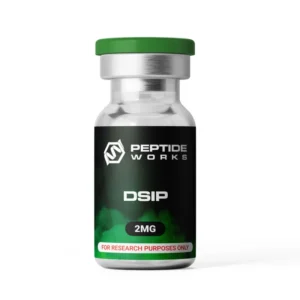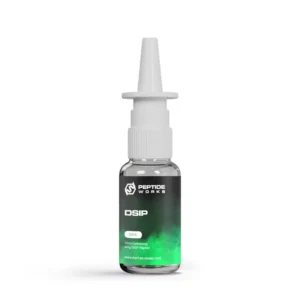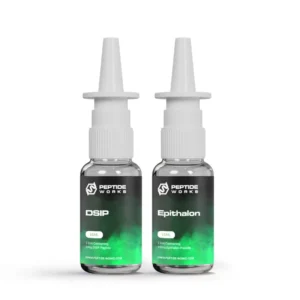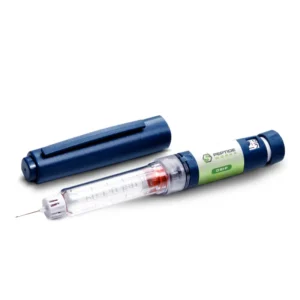PROMO!
First order? Get 10% OFF with this code: 1storder
Our Product Categories




The natural neuropeptide known as Delta Sleep-Inducing Peptide (DSIP) was first identified in the 1970s. Numerous tissues, including the brain, contain the nonapeptide, which is composed of nine amino acids. It is best known for encouraging sleep onset and controlling sleep-wake cycles. Research has shown that it interacts with a number of physiological processes within the central nervous system.
According to studies, it can enhance sleep efficiency, restore circadian rhythms, and improve the quality of sleep without sedation or drowsiness the following day. Beyond sleep, studies indicate it might be involved in hormone regulation, pain perception, and stress modulation. Although it shows promise for potential applications in stress management and sleep related peptide therapy, there is still much to learn about its workings and uses.
Peptide Sequence (IUPAC Condensed): Trp-Ala Gly Gly AspAla-Ser-Gly-Glu
Molecular Formula: C35H48N10O15
Molecular Weight: 848.824
Synonyms: Delta Sleep Inducing Peptide
View the DSIP Certificate Of Analysis (COA)

Delta Sleep-Inducing Peptide acts on the central nervous system through complicated mechanisms of action. Studies indicate that it affects neurotransmitters such as serotonin, dopamine, and norepinephrine, all of which play a role in supporting sleep, promoting mood enhancement, and reducing stress. By altering these systems, the peptide induces relaxation and helps to establish regular sleep rhythms.
In addition to its effects on neurotransmitters, the sleep peptide influences hormonal activity by lowering ACTH levels, which reduces stress-related cortisol production, and by enhancing growth hormone (GH) secretion, essential for restorative sleep. DSIP is thought to help you sleep better by promoting deep, slow-wave sleep and improving overall sleep quality.
It might also work as an antioxidant, protecting your cells against damage caused by oxidative stress. Plus, by regulating the HPA axis, it could help lower stress levels, supporting both your mental and physical well-being. Its interaction with opioid systems may also contribute to pain relief and further stress reduction, highlighting its potential therapeutic applications.
Buy DSIP Peptide Vial from Peptide Works for scientific research. This lyophilized powder is over 99% pure and available in 2mg, 5mg, and 10mg vials or as complete kits that include bacteriostatic water and syringes for accurate reconstitution.
Sleep Regulation & Quality: Sleep research indicates that the action of DSIP plays a significant role in sleep promotion by enhancing sleep efficiency and reducing sleep latency (the time it takes to transition from full wakefulness to sleep). Studies on human sleep behavior and chronic insomniac patients reveal that the peptide improves sleep architecture and sleep structure by promoting slow-wave (delta) sleep and supporting restorative, non-REM sleep [1].
Additionally, it normalizes circadian rhythms, reduces awakenings, and maintains rapid eye movement cycles without causing sedative effects or next-day drowsiness. Its neuroregulatory effects on the hypothalamus and GABAergic systems further contribute to improved overall sleep quality [2].
Reduces Stress & Anxiety: Research indicates that the delta-sleep-inducing peptide may act as a therapeutic agent by modulating the stress response through its effects on the hypothalamic-pituitary-adrenal (HPA) axis and stress hormones. Clinical trials reveal that DSIP injections significantly reduce ACTH levels in plasma for several hours with minimal impact on cortisol [3].
In animal studies, the impact of DSIP has been shown to mitigate stress-related changes in GABA, glutamate, aspartate, and lipid peroxidation, highlighting its potential to alleviate anxiety [4]. Additionally, altered DSIP responses in major depression and suicidal patients suggest its role in addressing dysregulated stress in mood disorders [5].
Neuroprotective & Cognitive Effects: Animal studies indicate DSIP promotes neuroprotection and cognitive health by enhancing mitochondrial function and reducing oxidative stress. DSIP enhances mitochondrial oxidative phosphorylation in the brain, which helps maintain brain function during periods of low oxygen (hypoxia).
Studies on rats that have had a stroke show that when DSIP is administered through the nose, it leads to better motor coordination and a smaller area of damaged brain tissue [6]. Additionally, analogs of the peptide have been shown to decrease infarct size in ischemia-reperfusion injuries and strengthen antioxidant defenses, highlighting their potential to protect brain health and support recovery from neurological damage [7].
Promotes Hormonal Balance: Research indicates it affects hormone regulation in several ways. Studies show it lowers ACTH levels in healthy men without impacting cortisol, suggesting it may help manage stress. In rats, DSIP stops somatostatin release through dopamine pathways, which could indirectly increase growth hormone (GH) [8]. It also raises luteinizing hormone (LH) in ovariectomized rats, but doesn’t affect FSH. However, studies in women reveal no effect on GH or prolactin, showing its hormonal influence is selective and varies by context.
Pain & Sensitivity Reduction: Research indicates that the peptide modulates pain perception through non-opioid mechanisms. In studies on rodents, DSIP has been shown to increase their tolerance to pain. These pain-relieving effects are blocked by drugs that affect norepinephrine, but not serotonin, suggesting that the pain relief works through adrenergic pathways [9].
In clinical settings, giving DSIP intravenously has been shown to reduce pain in most patients with chronic pain, including those with migraines and psychogenic pain. This highlights DSIP’s potential as both a pain reliever and a substance that can modulate the nervous system [10].
Cardiometabolic and Physical Health: Anecdotal studies suggest that it may have a positive influence on cardiometabolic and physical health. It supports blood pressure regulation with mild hypotensive effects by promoting autonomic balance. The peptide improves deep sleep, which helps your body recover physically, repair tissues, and strengthen your immune system, leading to better energy levels.
Additionally, early research indicates it has antioxidant qualities. This may reduce markers of oxidative stress and improve how well mitochondria (your cell’s energy producers) work. These combined effects show its potential to support overall physical health and metabolic function [11].
Buy DSIP Pre-Mixed Peptide Pen from Peptide Works for laboratory use. Each 5mg cartridge consists of lyophilized peptide pre-mixed with bacteriostatic water. It is available individually or as a full kit supplied with a reusable pen, needle tips, and a carry case for simple and precise preparation.
[1] O P Stanojlović 1, D P Zivanović, and V T Susić (2000) The effect of delta sleep-inducing peptide on the EEG and power spectra in rat – Indian Journal of Physiology & Pharmacology, 2000 Oct, Volume 44 (Issue 4), Pages 428-34.
[2] J M Monti, J Debellis, P Alterwain, T Pellejero, et al (1987) Study of delta sleep-inducing peptide efficacy in improving sleep on short-term administration to chronic insomniacs – International Journal of Clinical Pharmacological Research, 1987, Volume 7 (Issue 2), Pages 105-10.
[3] A Bjartell, R Ekman, S Bergquist, and E Widerlöv (1989) Reduction of immunoreactive ACTH in plasma following intravenous injection of delta sleep-inducing peptide in man – Psychoneuroendocrinology, 1989, Volume 14 (Issue 5), Pages 347-55.
[4] A M Mendzheritskiĭ, M G Makletsova, N I Uskova, I O Choraian, et al (1978) [Antistressor effect of delta-sleep-inducing peptide in hypokinetic stress] – Ukr Biokhim Zh (1978), 1991 Jan-Feb, Volume 63 (Issue 1):34-7.
[5] K P Lesch 1, E Widerlöv, R Ekman, G Laux, et al (1988) Delta sleep-inducing peptide response to human corticotropin-releasing hormone (CRH) in major depressive disorder. Comparison with CRH-induced corticotropin and cortisol secretion – Biologial Psychiatry, 1988 Jun, Volume 24 (Issue 2), Pages 162-72.
[6] E A Tukhovskaya, A M Ismailova, E R Shaykhutdinova, G A Slashcheva, et al (2021) Delta Sleep-Inducing Peptide Recovers Motor Function in SD Rats after Focal Stroke – Molecules, 2021 Aug 26, Volume 26 (Issue 17), Page 5173.
[7] E A. Tukhovskaya, E R. Shaykhutdinova, A M. Ismailova, G A. Slashcheva, I A. Prudchenko, et al (2021) DSIP-Like KND Peptide Reduces Brain Infarction in C57Bl/6 and Reduces Myocardial Infarction in SD Rats When Administered during Reperfusion – Biomedicines 2021, Volume 9 (Issue 4), Page 407.
[8] A Steiger, J Guldner, U Hemmeter, B Rothe, et al (1992) Effects of growth hormone-releasing hormone and somatostatin on sleep EEG and nocturnal hormone secretion in male controls – Neuroendocrinology, 1992 Oct, Volume 56 (Issue 4), Pages 566-73.
[9] A Nakamura, T Sugao, K Yamaue, M Kobatake, et al (1989) Involvement of spinal noradrenergic system in the mechanism of an antinociceptive effect of delta-sleep-inducing peptide (DSIP) – Brain Research, 1989 Feb 20, Volume 480 (Issues 1-2), Pages 82-6.
[10] W Larbig, W D Gerber, M Kluck, and G A Schoenenberger (1984) Therapeutic effects of delta-sleep-inducing peptide (DSIP) in patients with chronic, pronounced pain episodes. A clinical pilot study – European Neurology, 1984, Volume 23 (Issue 5), Pages 372-85.
[11] Elena M Khvatova, Victor N Samartzev, Pavel P Zagoskin, Igor A Prudchenko, and Inessa I Mikhaleva (2003) Delta sleep inducing peptide (DSIP): effect on respiration activity in rat brain mitochondria and stress protective potency under experimental hypoxia – Peptides, 2003 Feb, Volume 24 (Issue 2), Pages 307-11.

Buy DSIP Peptide Nasal Spray from Peptide Works. Available in 15ml and 30ml glass spray bottles, this non-invasive format provides an easy and efficient option for research use.
The evidence for DSIP’s effectiveness in chronic insomnia is still inconclusive. A few small studies indicate it may influence sleep regulation and help promote deeper rest phases, but results differ between studies. Its short half-life and unclear mechanism make it a less reliable option for managing sleep disorders based on existing research.
Preliminary animal research suggests that DSIP levels may influence stress and withdrawal responses by interacting with opioid receptors and potentially modulating opiate receptors. Some small studies have explored its role in the treatment of withdrawal symptoms, particularly in reducing alcohol or opioid dependence. However, the results remain inconclusive, and more clinical research is needed to confirm its potential benefits in addiction treatment.
Reported side effects of DSIP are limited because there are very few human studies. Some reports mention fatigue, vivid dreams, grogginess, or little noticeable effect. Since DSIP is not FDA-approved, its long-term safety, purity, and dosing are uncertain. Poor-quality products or improper use may increase potential health risks.
Provided as a lyophilized powder, it requires proper storage to maintain its stability. For short term storage, keep the vial in a cool, dry place away from direct sunlight. For long term storage, it is recommended to refrigerate the powder at 2-8°C or freeze it at -20°C for extended preservation. Once reconstituted, store the solution in the refrigerator and use it within the advised timeframe. Proper handling ensures the peptide remains effective for research purposes.
DSIP is not FDA-approved for human use in the United States. It can be legally purchased only for laboratory and research purposes, not for human consumption or medical use.

This blog explores the potential of sleep peptides like DSIP and Sermorelin to improve sleep quality and recovery. It highlights their role in enhancing deep sleep, balancing neurotransmitters, and supporting overnight healing. Ongoing research suggests these peptides may offer promising solutions for better sleep and overall well-being in controlled studies.

This blog explores the potential of DSIP peptide in reducing stress levels by regulating cortisol and improving sleep cycles. It highlights DSIP’s ability to block stress signals, enhance delta-wave sleep, and balance circadian rhythms. Ongoing research investigates its mechanisms and future applications for stress management in controlled laboratory settings.

This article looks at how Orexin A peptide may help with daytime fatigue. It explains its role in regulating wakefulness, focus, and energy, as well as its connection to narcolepsy and key neurotransmitters. The piece also compares Orexin A with DSIP, showing how both influence energy balance and sleep patterns in research.
Excellent Customer Support
Value For Money
99% Pure Guaranteed
World Wide Shipping
ALL CONTENT AND PRODUCT INFORMATION AVAILABLE ON THIS WEBSITE IS FOR EDUCATIONAL PURPOSES ONLY.
DISCLAIMER: These products are intended solely as a research chemical only. This classification allows for their use only for research development and laboratory studies. The information available on our Peptide Works website: https://peptide-works.com/ is provided for educational purposes only. These products are not for human or animal use or consumption in any manner. Handling of these products should be limited to suitably qualified professionals. They are not to be classified as a drug, food, cosmetic, or medicinal product and must not be mislabelled or used as such.